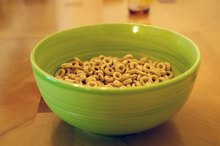Is 500 mg of Niacin Too Much?
If you have been searching for a vitamin or dietary supplement that may help you lower your cholesterol if it is high, you might have discovered niacin. Also, if you take a multivitamin, niacin or vitamin B3 may already be a part of your diet. However, taking 500 mg a once is likely too much; you will ideally want to split your dose into three small servings a day to ensure that your body absorbs this vitamin. Like any dietary supplement, consult your health care provider before taking niacin.
Types of Niacin
Niacin is vitamin B3. Like the other B vitamins, niacin helps your body convert carbohydrates into glucose, which is used as energy. Niacin, also similar to the other B vitamins, helps your body metabolize dietary fat and protein. Niacin helps support optimal skin, hair, nails and eye health. According to the University of Maryland, niacin doses far above dietary recommendations have been used since the 1950s to treat high cholesterol. Niacin may also help treat or prevent atherosclerosis, diabetes, osteoarthritis and possibly Alzheimer's disease.
Clinically Effective
Inositol Hexanicotinate Benefits
Learn More
Dr. Jonny Bowden Ph.D. and Clinical Nutrition Specialist, in his book "The Most Effective Natural Cures on Earth," explains that niacin is clinically proven to raise your high-density lipoprotein (HDL) "good" cholesterol and lower your low-density lipoprotein (LDL) "bad" cholesterol. Dr. Bowden considers this particularly significant because prescription cholesterol-lowering statins are not proven to improve both good cholesterol and lower bad cholesterol. A study in the 2003 "Journal of Nutritional Biochemistry" also confirms this. Researchers continue to find that niacin lowers LDL cholesterol, very low density lipoprotein (VLDL) cholesterol and your blood triglyceride levels while increasing your HDL levels. Niacin can also be combined with prescription statins to help encourage optimal cholesterol levels without interfering with your medication's effectiveness.
Dosing
The University of Maryland Center reports that niacin deficiencies are very rare and can easily meet your nutritional needs from solid foods such as salmon, tuna, seed, whole grains and fortified cereals. Males 19 years old and over require 16 mg of niacin each day. Females 19 years old and over require 14 mg of niacin each day. Yet, in order to potentially reap the cholesterol management benefits of niacin, you will have to consume a higher dose through supplementation. Dr. Jonny Bowden recommends that you take 300 mg of niacin three times a day. If you are supplementing with niacin as inositol hexanicotinate, you should take 400 mg, three or four times daily. However, consult with your doctor for the dose the most appropriate for you.
Types of Niacin
Is Niacin Good or Bad for the Liver?
Learn More
Dr. Jonny Bowden explains that you may encounter several types of niacin and may be confused on which to buy. Dr. Bowden states that you should purchase a niacin supplement with a label that reads "niacin or nicotinic acid". The niacin products that contain "niacinamide," an alternative source of vitamin B3, will not provide any cholesterol-lowering effects. Ask your doctor for a specific recommendation on which niacin supplement to buy if you are still uncertain.
Related Articles
References
- Linus Pauling Institute at Oregon State University: Niacin
- "The Most Effective Natural Cures on Earth"; Dr. Jonny Bowden; 2008
- University of Maryland Medical Center: Vitamin B3 (Niacin)
- "Journal of Nutritional Biochemistry"; Niacin and cholesterol: role in cardiovascular disease (review); Ganji SH, et al.; 2003
Writer Bio
Jenna Cee has been writing professionally since 2006. Her articles appear on 2Athletes.com and Women's Fitness Online. She is a personal trainer certified by the National Academy of Sports Medicine and as a fitness and sports nutritionist through the International Sports Sciences Association. Cee holds a Master of Science in human nutrition from Washington State University.









